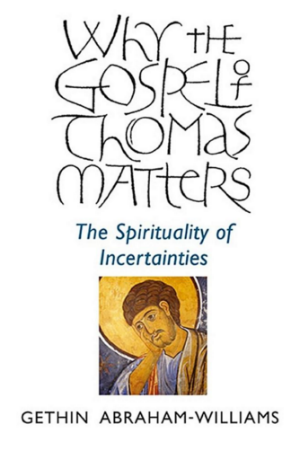How can we know?
Gethin Abraham-Williams ponders a question that still troubles our restless spirits, and finds a clue in a disciple too often overlooked
 Christianity struggles incessantly, inconclusively, as it must, not only to keep up with its insights into God, but to earth its interpretation and expression of those insights in terms of a particular understanding of the certainty of the unfathomable nature of God.
Christianity struggles incessantly, inconclusively, as it must, not only to keep up with its insights into God, but to earth its interpretation and expression of those insights in terms of a particular understanding of the certainty of the unfathomable nature of God.
It struggles with its willingness to acknowledge the importance of ‘incertainty’ in its interpretation of its beliefs, because, if God not only exists but is at least as Christians believe God to be, then our minds and our hearts can never risk being closed to the unfathomable, and the interpretation must always be provisional.
A forensic computer consultant once described to me how he and his wife had ‘occasionally discussed and explored the various phenomena observable in the universe, and also the dimensions of it, and some related issues, only to arrive at a point, ‘where there is a question to which the only correct answer, currently, is “No-one knows”.’
An avowed agnostic, he went on to admit: ‘The gospels very cleverly and knowledgeably deal with people like me in the shape of St Thomas.’
In the Christian tradition Thomas, therefore, emerges as the carrier of the questions that trouble and that still haunt the genuine enquirer. There is no other character within the New Testament writings who is shown to be grappling with ‘incertainty’ to the same extent, and grappling with it as an insider, as an apostle in the making, not as a marginal or disillusioned follower.
At the last supper it was Thomas who put his hand up to interrupt the flow of the rabbi’s sophisticated farewell discourses, five chapters long, with a show-stopper of a question: ‘How can we know?’
The certainties that had kept him together had begun to unravel. He had ‘lost it’. There at the last supper, as Jesus broke bread the words and the actions collided, leading Thomas to feel exposed, dysfunctional, vulnerable.
Earlier Simon Peter had asked, ‘Where are you going?’ But Thomas’s enquiry is much more incisive, much more personal. The emphasis in Thomas’s question is on the How? How can we know?
The question in one form or another still perplexes and troubles those who are earnest in their endeavour to nurture their spirituality, but unwilling, or, perhaps truer, unable, as creatures of a post-modern world, to handle the elusiveness of the intangible. ‘We’ve no idea where you’re going, so how can we know how to get there?’
In the so-called Gospel of Thomas, discovered in Upper Egypt in 1945, I think it’s possible to see, not so much how Thomas got his answer, but how he found the question ultimately irrelevant.
New Testament translator, John Henson, has produced an eminently readable version of the Gospel of Thomas in his Good as New: a Radical Re-telling of the Scriptures (o-books, 2004). It’s the one I used to show why I think the Gospel of Thomas matters.
‘We are caught in a difficult moment in history,’ says the Australian academic, David Tacey, ‘stuck between a secular system we have outgrown and a religious system we cannot fully embrace.’ It is a perceptive analysis of a critical moment in the evolution of our relationship with all that we mean by God.
Faith is too subtle to be packaged into simplistic definitions and precise formularies. The importance of Thomas, therefore, not least as he emerges from his collection of the Sayings of Jesus in his Gospel, as well as in the scattered references to him in the Fourth Gospel, is that he epitomises how ‘incertainty’ is the process whereby faith is explored and refined.
‘Incertainty’ is not the sign of opprobrium conventional orthodoxy might wish to brand it, but a mark of exquisite spiritual sensitivity that resists facile attempts to confine and conform, in favour of being fully aware of the present moment whilst also remaining open to the challenge Jesus once put to the disciples:
‘When you learn something which sheds new light on things, you can either act on it or ignore it. Which will you do?’
Gethin has served Baptist churches in Coventry, Sutton Coldfield and Sutton, Surrey, before becoming General Secretary of Churches Together in Wales: Cytûn. His latest book, Why the Gospel of Thomas Matters: The Spirituality of Incertainties (2015, Christian-Alternative) is available as an e-book and in paperback.
Baptist Times, 23/11/2015